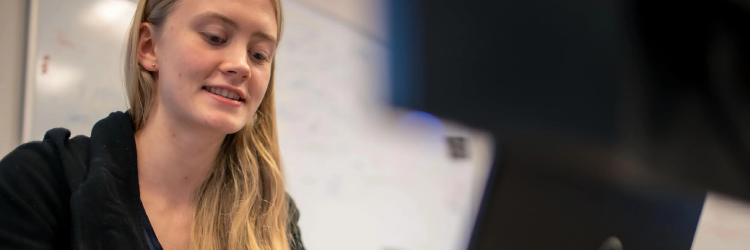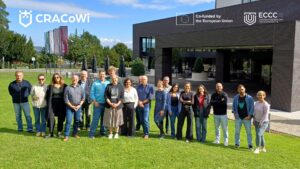From the outside, the developer’s job looks pretty boring. Kathleen, our intern, seems to be doing nothing but looking intently at a screen and typing something into a keyboard. What the casual observer doesn’t know is that Kathleen is developing superpowers to give an inanimate piece of hardware special abilities. Which fascinates her.
Girl's Day at erminas
Kathleen is 17 years old. For two weeks, the high school student traveled 1.5 hours every morning by public transport to Oldenburg to do her internship with us. After graduating from high school, she would like to study computer science. This makes her part of a still very small group of young women who have discovered this specialty for themselves. Only around 20 percent of computer science students are women, and the trend is only rising very slowly.
“There are still far too few of them,” emphasizes erminas CTO Yvette Teiken. The computer scientist, who holds a doctorate in computer science, is keen to inspire girls to become developers. “Life around us is being digitized, especially by men. I would like to see much more balance.” She knows what she’s talking about. When her professor entered the lecture hall, he greeted the students with the words: “Hello, gentlemen, hello Yvette.” She was the only woman in the room.
Digitalization needs diversity
Digitalization is changing everything. If we leave it to men only, it will be without malice to the detriment of women. If we leave it to the older developers, it will be to the detriment of younger people. And so on. Digitization needs diversity so that everyone can join in and participate. We need digital designers. That’s why it’s important to get young girls interested in IT. But women are still more likely to choose professions that are overtly social or creative. As a developer, you can be both.

Kathleen presses the Enter key. A red LED lights up on a white plastic board next to her keyboard. Kathleen grins. The red light indicates that it has done everything correctly. During her internship, she learned the basics of the programming language Python. Using a Raspberry Pi, a breadboard, a few jumper cables, resistors and LEDs, she has now successfully programmed a traffic light circuit. The magic behind it: With the skills she acquired during her internship, she could already control air conditioning systems in space stations, feeding systems in horse stables and flying umbrellas.
IT jobs: social and creative
“I do it because I’m curious,” says Kathleen. “I’m interested in how things work. And I want to combine this knowledge with other skills later on.” She once played around with an Arduino with her father and taught herself a little C. She was really impressed by our Girls’ Day 2018. Together with five other girls, with Calliopes and a plastic box and lots of hot glue, she built a school locker that can be opened and closed with an individual key from the Calliope.
The combination of practical research and development work and programming also fascinated Kathleen during her internship: “I was surprised that I wasn’t just sitting at a computer all the time,” she says. For one customer, an erminas developer had to develop a measuring method to find holes in a product. Kathleen assisted in setting up the experiment and was able to get involved. “For me, computer science was ‘programming’ – now I know how much more there is to it.”
She has also realized that you need social skills to understand customers and their needs. So if you have an interest in technology and actually wanted to work at a kindergarten or as a teacher, you could, for example, develop games and educational apps after studying computer science.



So much more than math
The problem is that girls rarely come into contact with practical digitization issues in their everyday lives. While boys are more interested in technology and programming per se, not least because they are still much more likely to be involved in technical matters in their social environment, girls’ interest in our education system is still directed towards “typical female professions”.
There is a lack of teachers who can playfully incorporate digital knowledge into their school subjects. This would even be possible in religious education, as a student project at Altona grammar school has shown: Here, the question of how digitization can be used to do good was posed. In this project, the young people developed an autonomous transport table for wheelchair users. But ethical issues were also addressed.
Girls often develop a completely different approach to digitization topics than boys. While boys are often interested in the technology itself and can work their way into it meticulously to understand how it works and what they can then do with it, girls often ask the question about the problem first: What does the vision of the goal look like? What is the task? Which question would I like to answer? What problem do I want to solve? What would I like to invent? What do I want to design? Once they have answered these questions for themselves, they look for ways to achieve their goal.
Dr. Yvette Teiken and her team developing a digital flower pot with children at CodeWeek Hamburg.
The image of developers in the media rarely reflects how many opportunities, skills and creativity there are in digitization. You often just see someone staring at a monitor and typing on a keyboard. Only a few people are really aware that computer science studies, like business studies, are used in all areas of life.
“That is why we are participating in the Girls’ Day and also support projects such as Jugend hackt or the CodeWeekwhere great value is placed on diversity,” says Yvette Teiken. “We can’t wait for good female programmers to just fall from the sky.” She is always on the lookout for new colleagues, because her goal is to have a balanced erminas development team.
Kathleen may come back in a few years, after her studies: “I really liked the familiar and friendly atmosphere.” We would be delighted, Kathleen!
further links
AppCamps – AppCamps offers free teaching material for teachers and schools
Calliope Mini – Mini-computer for a playful approach to the digital world from 3rd grade onwards
CodeWeek Hamburg – This is where the annual kick-off event of the European CodeWeek takes place, where children and young people are introduced to programming in a playful way.
Fobizz – At Fobizz, teachers can easily train themselves in digital topics and receive inspiration and material for the classroom
Girls’ Day throughout Germany – initiative for girls in traditionally male professions
Jugend hackt and Jugend hackt for girls and Jugend hackt Labs – Hackathons and Makerspaces
Komm, mach MINT – Project map with further STEM project offers throughout Germany


